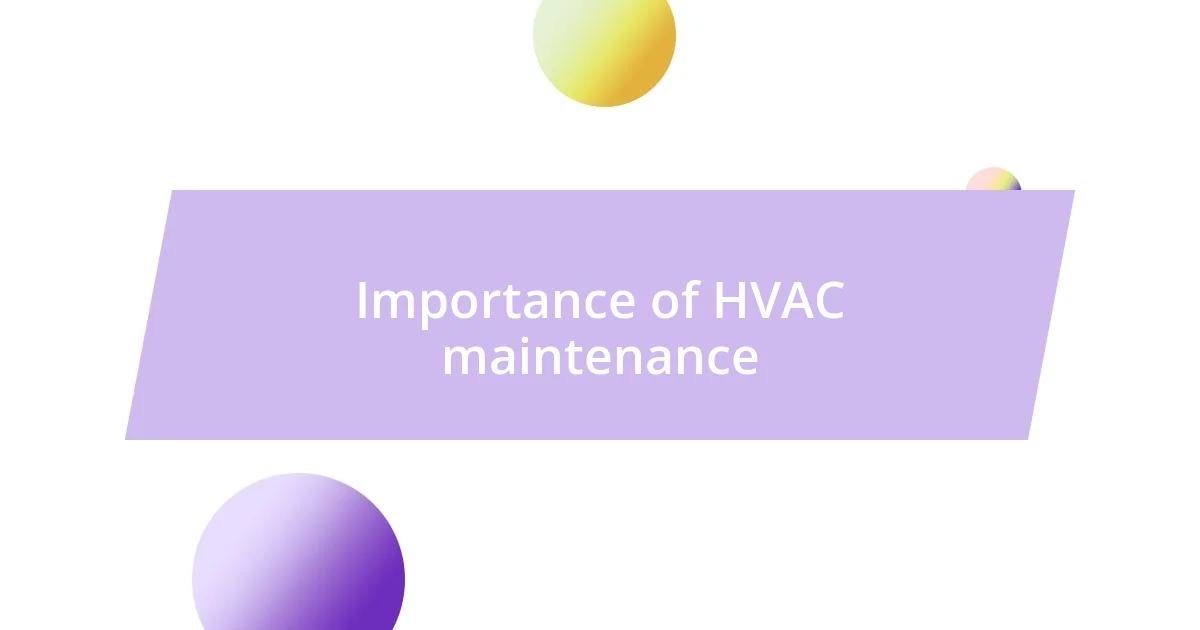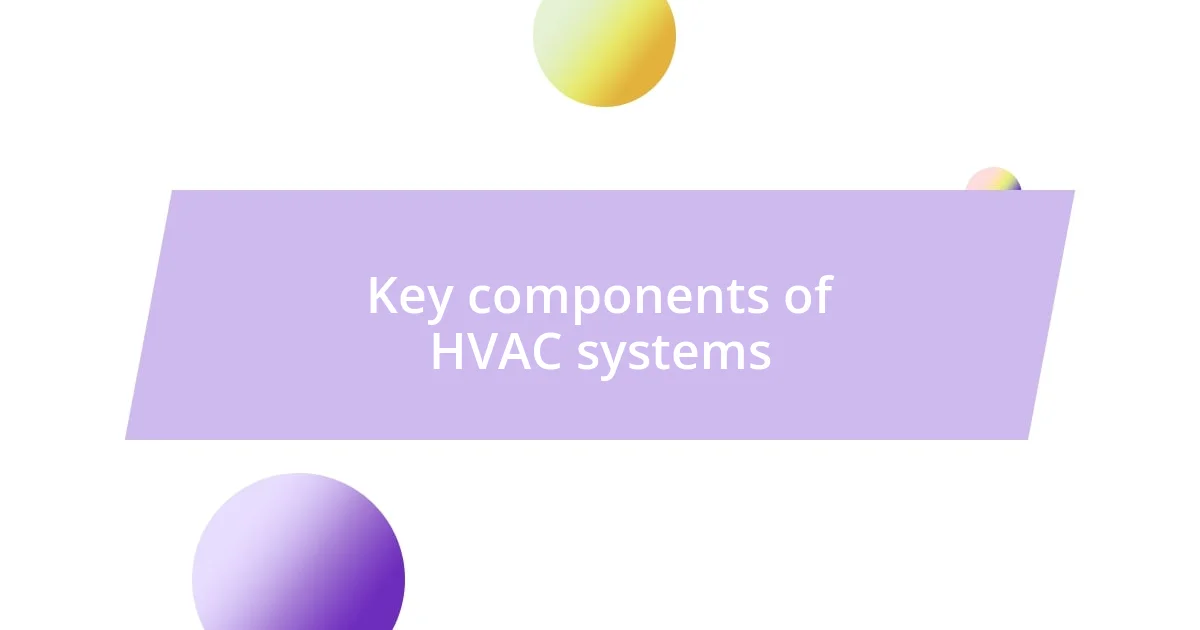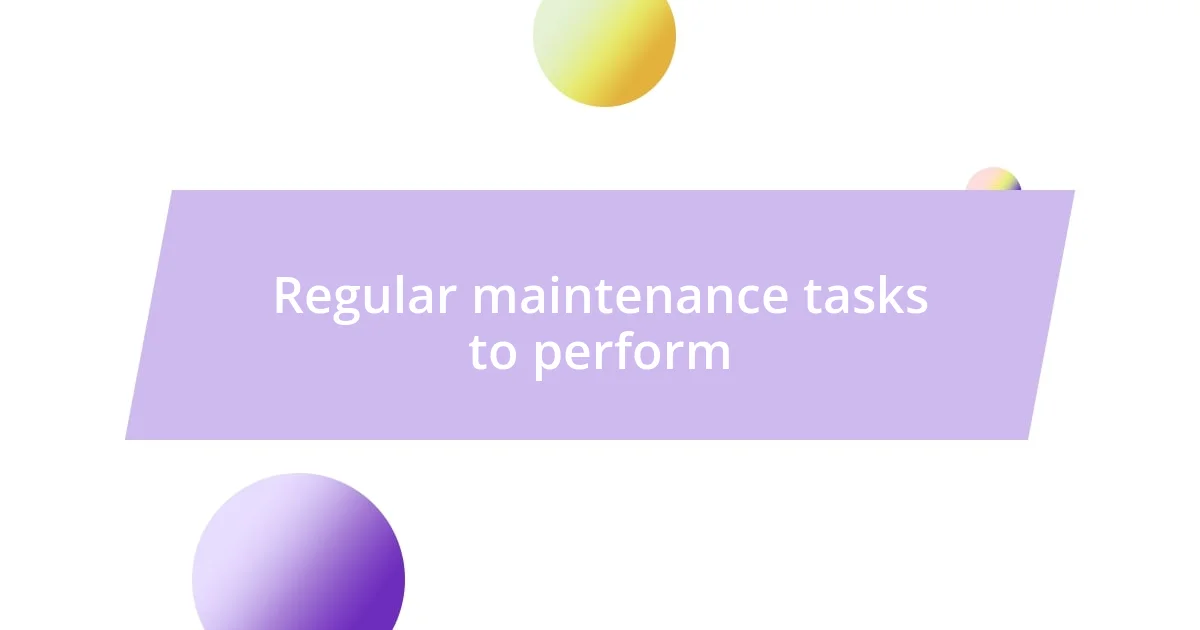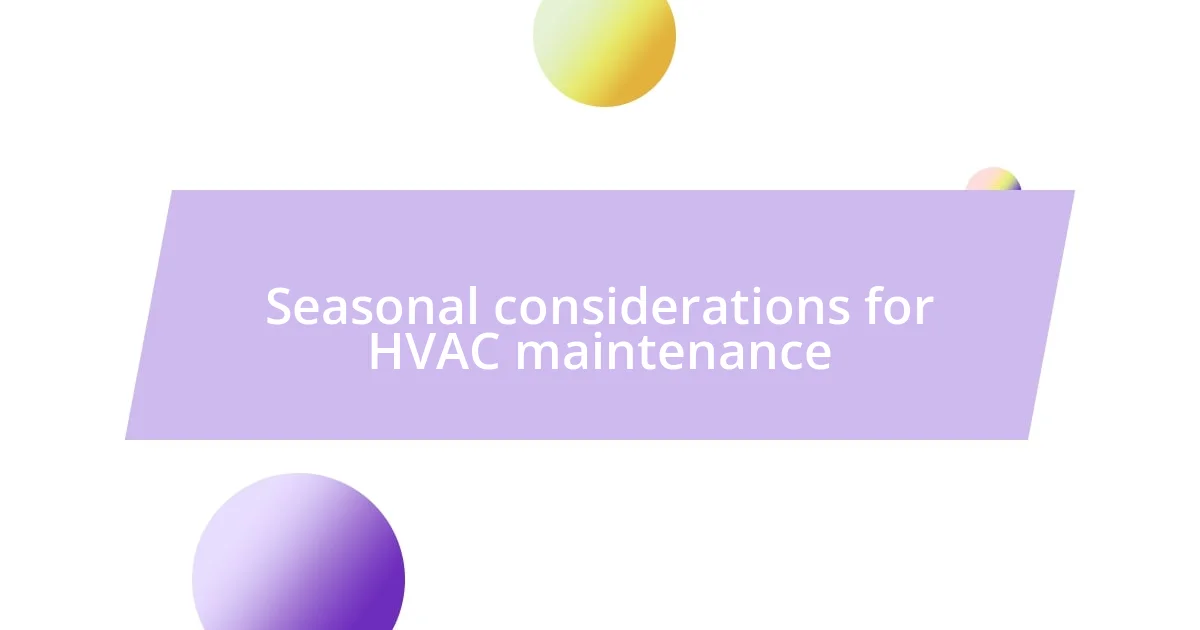Key takeaways:
- Regular HVAC maintenance, including changing air filters and cleaning condenser coils, is essential for comfort, efficiency, and avoiding costly repairs.
- Key components of HVAC systems—like the furnace, air conditioner, ventilation, thermostat, and ductwork—require attention to ensure smooth operation and air quality.
- Seasonal maintenance and inspections can prevent system failures and improve air quality, ultimately enhancing comfort year-round.

Understanding HVAC systems
HVAC systems are essential for maintaining comfortable indoor climates, but they’re often misunderstood. I remember the first time I attempted to adjust the thermostat in my home; I wanted a cozy environment for a chilly evening, yet I was baffled by all the settings. How many of you have felt that same frustration when trying to figure out your system?
At their core, HVAC stands for heating, ventilation, and air conditioning. Each component plays a crucial role in your comfort. Without proper ventilation, you might as well be sitting in a stuffy room, and trust me, that’s never a pleasant experience. I vividly recall a summer when my AC broke down, leaving me sweltering while trying to work from home. The realization that a well-functioning HVAC system affects not just comfort but productivity was eye-opening.
Understanding how these systems function can empower you to make informed decisions about maintenance and repairs. I often ask myself why some people overlook routine check-ups when a small investment can save them from costly repairs. If we treat our HVAC systems with care, like a good friend, they will return the favor by keeping us comfortable year-round.

Importance of HVAC maintenance
HVAC maintenance is not just about keeping your system running; it’s about ensuring your comfort and wellbeing. I still remember a particularly frigid winter when my furnace sputtered right before the holidays. The stress of unexpected repairs—and the thought of a chilly house during family gatherings—was overwhelming. Regular maintenance would have prevented that situation altogether, highlighting how essential it is for a peaceful home environment.
Neglecting HVAC upkeep can lead to a host of issues, from reduced efficiency to even health hazards due to poor air quality. I’ve experienced the difference firsthand. A single dirty filter caused my system to work overtime, resulting in higher energy bills and an uncomfortable living space. Routine checks are a simple solution that not only help in avoiding larger problems but also create a more energy-efficient home, benefitting both the wallet and the planet.
Incorporating regular maintenance into your schedule pays off significantly over time. I’ve grown accustomed to setting monthly reminders to check my filters, and it has become a comforting routine. Knowing my HVAC system is in good shape allows me to focus on what really matters, whether that’s enjoying the warmth in winter or a cool breeze in summer. Isn’t it time we all put this simple method into practice for our peace of mind?
| Benefits of HVAC Maintenance | Consequences of Neglect |
|---|---|
| Improved Efficiency | Higher Energy Bills |
| Longer System Lifespan | Frequent Breakdowns |
| Better Air Quality | Health-Related Issues |

Key components of HVAC systems
Understanding the key components of HVAC systems is essential for keeping them running smoothly. From my own experiences, I’ve observed how neglecting even the smallest part can lead to significant discomfort. For instance, when I first bought my house, I underestimated the importance of the air filter. After a month of ignoring it, I realized the air was much dustier than I had imagined. A simple change transformed my living space; suddenly, I could breathe easier and enjoy clearer air without the constant sneezing.
Several key components make up an HVAC system, and each plays a distinct role in its performance:
- Furnace: Responsible for heating your space during colder months.
- Air Conditioner: Cools the indoor air, ensuring comfort during summer.
- Ventilation system: Provides fresh air and removes stale air, crucial for air quality.
- Thermostat: The user interface that controls the temperature settings.
- Ductwork: Channels air to different areas of your home, promoting even distribution.
Each of these components needs regular attention, just like any other tool or appliance we use daily in our lives. When I think about it, a well-functioning HVAC system is much like a well-tuned orchestra; if one instrument is out of sync, the entire performance can suffer. It’s essential to stay on top of these components to avoid costly repairs and enjoy a comfortable atmosphere year-round.

Regular maintenance tasks to perform
One of the most straightforward maintenance tasks I recommend is replacing your air filter regularly. I’ve learned the hard way that a clogged filter not only restricts airflow but can also strain the entire system. Imagine being in the middle of a scorching July day, only to realize your air conditioner is barely producing a breeze—all because I forgot a seemingly simple task like changing a filter. Now, I make it a point to check my filters monthly, and it has drastically improved my home’s comfort.
Additionally, checking and cleaning the condenser coils is crucial. A few years back, I noticed my air conditioning unit wasn’t cooling effectively, and after some investigation, I found the coils covered in grime. It was a massive wake-up call! Once I cleaned them, the unit operated like new again. Have you ever experienced that sense of relief when something so easy to fix makes an immediate difference? Regularly removing debris from the coils prevents overheating and prolongs the life of the system, making it a no-brainer for upkeep.
Lastly, I can’t stress enough the importance of scheduling annual professional inspections. This isn’t just about ticking a box on a to-do list; it’s an investment in my home’s long-term comfort and efficiency. The peace of mind I gain from having an expert ensure everything is functioning properly cannot be understated. Just last year, my technician discovered a small refrigerant leak during one of these checks, which could have turned into a costly repair if left unchecked. Imagine how I felt knowing I avoided that headache! Keeping a dialog open with your HVAC professional about your system’s status is invaluable.

Signs your HVAC needs repair
When your HVAC system starts making strange noises, that’s often your first sign that something might be off. I’ll never forget the day I heard a loud clanging while my furnace was running. My heart sank as I thought about potential repair costs. I quickly learned that odd sounds—like banging, rattling, or hissing—should never be ignored. They can signal loose or damaged components that need immediate attention.
If you notice uneven temperatures throughout your home, it could be another indicator of HVAC trouble. I remember one summer when my living room felt like a sauna while the bedrooms were Arctic. It was so uncomfortable that I found myself switching rooms just to cool off. I eventually realized that blocked ducts were forcing the system to work harder than necessary. This not only led to higher energy bills but also meant the system could wear out faster. Has something similar ever happened to you?
Lastly, if you start noticing an increase in your energy bills without a change in usage, it’s time to investigate. There was a month when my electric bill was shockingly high, but nothing in my routine had changed. After doing a bit of digging, I discovered my AC unit was struggling due to an old, dirty filter. Once I fixed that, I felt an incredible relief—not just financially, but emotionally too, knowing I could maintain my home without breaking the bank. Recognizing these signs early can save you from the stress and expense of major repairs down the line.

Best practices for HVAC upkeep
One of the best practices I’ve adopted for HVAC upkeep is keeping a close eye on the thermostat settings. I remember a time when I set the thermostat way too low thinking it would cool my home faster, only to end up with an overworked unit and a skyrocketing energy bill. By maintaining a moderate temperature and using programmable thermostats, I’ve struck a balance—saving energy while ensuring comfort. Have you ever considered how small adjustments can lead to substantial savings?
Another crucial aspect is ensuring the area around the outdoor unit remains clear of obstructions. I once neglected this during a fall cleanup and found my unit struggling to breathe amidst fallen leaves and branches in the spring. It hit me then how environmental factors could hinder efficiency. Now, I make it a habit to check and tidy that space consistently. A clear path for airflow not only enhances performance but can also extend the life of the unit.
Lastly, don’t underestimate the importance of sealing leaks in ductwork. I vividly recall discovering air leaks during a home energy audit—it was shocking to see how much conditioned air was escaping! That moment made me realize how essential it is to keep ducts insulated and sealed. Tackling leaks can drastically improve the efficiency of your HVAC system, leading to both comfort and cost savings. Have you ever done a quick inspection of your ducts? It might surprise you what you find!

Seasonal considerations for HVAC maintenance
As the seasons change, it’s crucial to adjust your HVAC maintenance accordingly. For instance, I always make it a point to have my system serviced in the spring before the heat of summer hits. I can recall being caught off guard during a heatwave a few years back when my AC unit sputtered instead of cooling. You can imagine my frustration! Now, I have a checklist for seasonal maintenance, ensuring everything runs smoothly when I need it most. Have you thought about how seasonal outages can disrupt your comfort?
In the fall, I take extra care to prepare my heating system for the cold months ahead. I still vividly remember an early winter when my furnace decided to give out on the first frosty night. Panic set in as I rushed to find a repair service. Now, I schedule a check-up each October, which has brought me peace of mind. I find that investing time in preventative measures during the transitional seasons can prevent disastrous surprises. Have you ever regretted waiting too long to address maintenance?
Lastly, let’s not forget about the filters! I find it remarkable how one small component can make such a big difference throughout the year. Personally, I used to overlook the importance of changing filters regularly, but that changed after I saw the dust buildup on my old filter after just a month. The change was notable; not only did my system run more efficiently, but my allergies improved too. It’s a little task that goes a long way—how often do you check your filter? You might be surprised at how much cleaner your air can feel!














